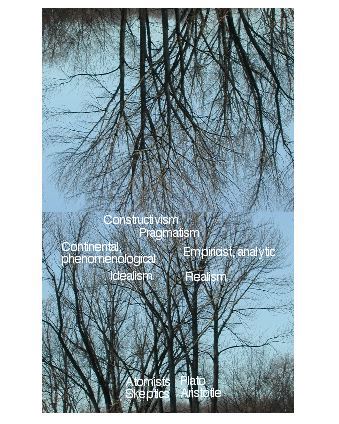Philosophy 310=Biology 310
Bryn Mawr College
Spring, 2005
12 April
Re-Thinking Philosophy of Science?
III. The Human Brain as an Emergent with Transcendental Capabilityhttp://serendipstudio.org/sci_cult/philsci/s05/12april.html

- Realism vs constructivism - is there a world out there? if so, what is its character? can we know it? how? ... metaphysics vs epistemology ... validity of a correspondence theory of truth; issue of imputationalism (Berkeleyan "idealism")
- Granted, then, that empty space extends without limit in every direction and that seeds innumerable are rushing on countless courses through an unfathomable universe ... It is in the highest degree unlikely that this earth and sky is the only one to have been created ... Lucretius, c 99-55 BC
- "Philosophy is its own time raised to the level of thought" ... Hegel, Elements of the Philosophy of Right, 1821
- [this system of logic] is not something distinct from its object and content; for it is the inwardness of the content, the dialectic which it possesses within itself, which is the mainspring of its advance ... Hegel, Science of Logic (paragraph 63), 1815
- Thus the dialectical movement of substance through causality and reciprocity is the immediate genesis of the Notion, the exposition of the process of its becoming ... Hegel, Science of Logic (paragraph 1281), 1815
- Evolution as conceptual scheme "incomensurable" with Popperian "realism"? perhaps somewhere between "realism" and "idealism" (not imputational but Platonic?)
- no designer, blueprint, conductor
- algorithmic exploration, what is depends on what has been and randomness
- no final state (asymptotic or otherwise)
- no "essentialism", no "immutables"
- species (at any given time) themselves examples of "incomensurables"
- no form/content distinction?
- Biological evolution proceeds in the absence of a planner/conductor/intent and hence with no form/content distinction. it is an ongoing exploration of quasi-stable forms of matter rather than a "struggle to survive" and is characterized by/reflects "model making" capability, internal organizations that contain information about the surroundings and result in actions anticipating external change. These have both strengths and limitations.
- Biological evolution is itself the result of an older and continuing exploration involving the "active inanimate". Once coming into existence, model makers became themselves a causal influence on the "active inanimate".
- Philosopy (indeed all human thought) as not the beginning but the product (itself evolving) of a larger process of evolution lacking designer/blueprint/conductor/essentiality/meaning except insofar as it creates/adds such things?
- An evolving, non-deterministic, somewhat inchoate "out there", which in turn discovers, brings into existence causally significant "intentionality", "word", "meaning"?
- The existence and significance of "story telling"
Unitariness gives rise to conflict/counter-factuals which in turn solves hill climbing problem and hence gives rise to "intention", "meaning", "reality" (all brought into being by existence of differences between "conceptual frameworks" without a reference framework).
Albert Camus, The Myth of Sisyphus, 1942
"There is only one really serious philosophical question, and that is suicide. Deciding whether or not life is worth living is to answer the fundamental question in philosophy. All other questions follow from that ... Thus, convinced of the wholly human origin of all that is human, a blind man eager to see who knows that the night has no end, he is still on the go. The rock is still rolling."
Some nervous system preliminaries:
- Fundamental dependence on input for any "out there" information
- An active explorer rather than a passive absorber
- A creator rather than responder
The bipartite brain as product of evolution and generator of "notion", "word", "purpose", meaning
(another version)
Implications:
- There is no "purpose", "meaning" independent of the brain
- There is no "reality" independent of the brain, though there is probably something "out there"
- There are multiple stories of "reality" of which the very idea of "reality" is itself one
- Stories have causal significance, influencing the ongoing process of emergence as well as the stability of the story tellers themselves
- The "bumping against" of stories is itself a meaningful creative influence on the active inanimate, on life, and on the process of story telling itself
- Implications for science? philosophy of science? for philosophy itself?
- Generativity in future rather than summary of past, description of "reality"?
Your thoughts? Welcome in course forum area.
| Course Forum | Course Home Page |
| Science in Culture
| Serendip Home |
Send us your comments at Serendip

© by Serendip 1994-
- Last Modified:
Wednesday, 02-May-2018 11:57:09 CDT
